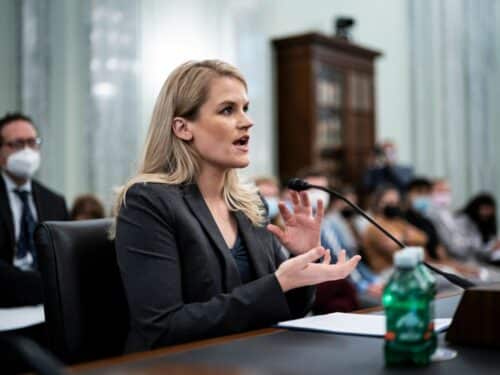Be concerned about the growing influence of Tech Giants
The top 5 brands in the world are now all tech companies. According to recent reports, the world’s most valuable brands are Apple, Amazon, Microsoft, Google, and Samsung measured by brand value and financial performance. In case you don’t think that’s surprising, just stop and think of ANY famous brand you can name …. Maybe its McDonalds or Coca Cola, Mercedes or BMW, Nike, Gucci, Chanel or Prada … and then forget about them. They are all behind the tech giants in brand value — most of them way behind. Gucci’s brand value is only 4% of Apple’s.
Brand value is concerned with ‘mind share’- the extent to which we desire, depend and aspire to own the products that these organisations produce. And there’s always something new and enticing. We recently heard about the “metaverse” (a 3D immersive internet), Artificial Intelligence (AI) robots that look after us, and 3D printers that print food now sold in restaurants in Europe. Facebook even rebranded itself (somewhat clumsily) as Meta. Meanwhile, Elon Musk, founder of PayPal and Tesla, announced Tesla’s household robot for 2022. Slightly tongue in cheek, he said, “it will be small enough to push over”, and “it probably won’t work”. OK good, so now we only have to worry about the big robots that do work!
Those things are all future, 2022 events. But the benefits that these brands bring to us are numerous and already here — from the way we breezily wave our phone to pay a bill, to smart home assistants like Alexa and Siri. And it’s been a Godsend these past two years as it enabled churches to continue and even grow. We no longer even view technology as anything special. We grab our smartphone the same way we used to pick up a pen, and we Google our questions without a second thought. Technology is “disappearing”. It’s becoming a natural extension of our brain.
But what are the concerns for Christians with the rise of the internet behemoths?
Always on, everywhere
At the simplest level, there is the immersive and addictive nature of the always-on, everywhere you go, mobile internet, particularly for young people. This was highlighted in 2021 by Facebook employee-turned-whistle-blower Frances Haugen. Haugen leaked information exposing the fact that Facebook was aware of the harm its platform was enabling, especially among teenage girls, but deliberately chose to do nothing about it as that could risk its hundred-billion-dollar revenues.
Our addiction to technology of course is not just limited to teenagers, we are all vulnerable. Our smartphones are the technological equivalent of sugar – leaving us always wanting more. It’s not surprising then that some have described smartphones as “the cigarettes of our century”. Of course, Apple, Google, and co strongly assert they are giving users what they want. But in the long term, is it what we want?
Then, there is the mass gathering of personal data. The business models of tech companies rely on advertising. Their ads work so well because they know you so well. You have seen the powerful recommendation engines on the web: people who buy this also bought that. Well, now it’s more like: people who typed that, or looked for that, or said something to Siri, or posted a photo from this place … will definitely want THAT! Our phones and tablets have become sophisticated tracking devices.
Facebook whistle-blower Francis Haugen in court
There’s nothing wrong with the responsible gathering of personal data based on our permission or opt-in, and there are benefits for us. The problem is that it’s very difficult to not opt-in, ie to not ACCEPT the small-print, conditions, and cookies that pop up on the internet. Consequently, Facebook, Apple, and Google have built up detailed profiles of our preferences and habits WITH our permission but, often, WITHOUT our knowledge.
But why does this matter? It matters because we rely on those with intimate knowledge of us to direct and guide us. This includes parents, close friends, and of course, God. Think, for example, about the well-known Psalm 139 It beautifully describes God’s deep knowledge of us and how He always knows what we are doing: ”You discover my thoughts. You notice everything I do and everywhere I go. Before I even speak a word, you know what I will say … where can I go to hide from you?” (v2‑4 and 7). This is a great comfort because we believe that God has our ultimate good at heart. However, if as someone has said, “Facebook knows more about you than you”, there may be a point at which we unconsciously, begin to depend more on the profiled information stored by tech giants, than we do on God. Young and Kinaman in their book The Hyperlinked Life state: “The internet has become … an idol of our time, commanding a central place in our lives as well as attention and huge respect, and with the final say in many of our dealings and desires”. Of course, that idea is very far-fetched right? … Well if you think that, ask yourself: when it comes to making decisions, do I consult God as often as I consult Google?
Powers and authorities
The internet is slowly becoming “centralised”. It’s colossal influence and control is increasingly wielded by this tiny group of brands. None of them set out to do harm, quite the opposite in fact. But, at the end of the day, these organisations must deliver financial success to shareholders. Every quarter has to be better than the one before. That compels them to behave in certain ways. And it’s these brands that we obsess over, its these organisations that we hand over our personal data to, and it’s their products we can become addicted to.
This growing centralisation of authority and control means there are changes afoot in our world, whether intended or not. In case you still need convincing, observe how Facebook, Twitter and Google have become the key battleground for modern warfare between nation-states, including direct attacks on industries, and the power to manipulate crowds and interfere with democratic elections.
Paul, in more than one place, warns of the dangers of not recognising how much authority and influence alternative “powers and authorities” can command – that means any earthly power that offers an alternative authority to God’s authority. And the addictive nature of technology, combined with the mass gathering of personal data, and their sheer reach into populations, gives the tech giants colossal authority.
As Christians, we are all prone to unhealthy addictions, but we should not be mastered by anything of this world. The Christian life requires us to have one ultimate authority, which is Jesus Christ. Anything that competes becomes one of Paul’s powers and authorities. The Christian life also requires us to do more than scan and surf. Spiritual depth requires us to be able to pray for more than a couple of minutes, to memorise scripture, to love God with all our mind, and, occasionally, to be able to disconnect and to live at least our Sabbath in “airplane mode”.
Will these brands continue to serve us, or is there a point at which they become “idols of our time”, with us serving them? Watch this develop over the next 12 months.





Hi Chris. Just came across your blog 7 minutes and read several articles. Appreciate the way you present the information. Glad to know that you as a believer and technologist are using your skill sets for God in the digital space,
Fascinating mate
I never knew half of that
Always a pleasure Many thanks!
Thanks for highlighting this issue Chris. It’s a huge concern and getting God’s perspective on the implications for us and the world is really important. We should do more theological reflection on things like this.
Yes I think the eventual implications will reach much wider and be much more pervasive than any of us can yet see
Your analysis is spot on. The next wave of tech companies emerging as giants are the online gaming platforms, who already influence the lives of so many children and young adults. This would be a good subject for your next blog, and is going to need some serious thought and research by all of us in Western societies because of the potential for causing harm.
Interesting — yes there are gaming platforms themselves (PS, Xbox and the like) as well as what they call the gamification of many aspects of life. I also think we will increasingly see AR (Augmented Reality) coming into many tasks like shopping or exploring a new city as a tourist with a smartphone and I think that overlaps with gaming.
This may indeed be a fruitful area for a blog 🙂
Thanks for this Chris. Google are always asking me for more info about myself for I allow only limited access to the Computer and completely ignore all adverts. I don’t have a smart phone and never will although I do have an old fashioned mobile phone. I’m one of the fortunate ‘older folk’ who are accommodated at present and I hope to soon go on to the city ‘whose builder and maker is God’ from where I will definitely be praying for those left behind!! For long years we have known what the scriptures teach and without getting into Qanon… Read more »
Thanks so much for your encouraging note Tina — sounds like you are a well-disciplined person when it comes to “switching off”!
(And don’t be going anywhere any time soon. some of us really appreciate your kind words!)